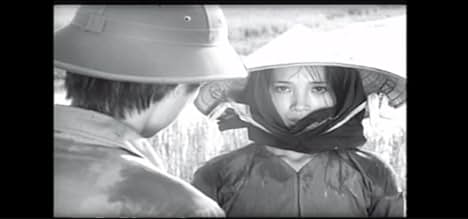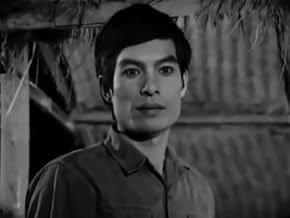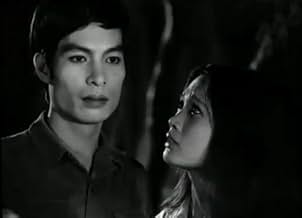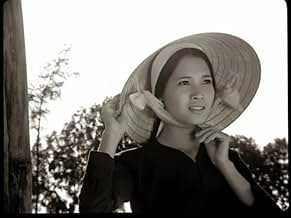अपनी भाषा में प्लॉट जोड़ेंDuyen faces a daily struggle to care for her young son and her weakened father-in-law, while keeping secret the fact that her husband died in a battle during the war.Duyen faces a daily struggle to care for her young son and her weakened father-in-law, while keeping secret the fact that her husband died in a battle during the war.Duyen faces a daily struggle to care for her young son and her weakened father-in-law, while keeping secret the fact that her husband died in a battle during the war.
- पुरस्कार
- 1 जीत और कुल 2 नामांकन
फ़ीचर्ड समीक्षाएं
Couldn't say anything more. This movie comes to the heart of any person who lived through the war especially those in the North of Viet Nam. The movie gives one of the best portrayal of the suffering, in particular, of those women who lost their husbands, and of the children who lost their fathers during the war. The suffering is deepened when a noble will is condemn by the society, and when those related to the story have to face conflicting emotions all the time. Le Van shows her best performance, as well as Dung Nhi (?) and The Anh. See the movie and you will understand more the lives of Northern Vietnamese during the War.
"When the Tenth Month Comes" will probably appeal to a very small segment of the movie-watching public. Even foreign film buffs may find this movie simplistic and uninteresting. The strength of the movie lies in it's characterization of traditional pre-Communist values in Vietnam. The protagonist Zuyen who hides her husband's death from the rest of his family, provokes the question: who rightfully owns the memory of the fallen soldier. The film's answer is that it is the family, but not the state that has the right to the memory of the fallen soldier. Zuyen is wrong for hiding her husband's death from her father-in-law, but the rest of the society has no right to his memory, because they did not love him as she and his family did. The film is markedly pro-Confucian and anti-Communist. The English-subtitles for the movie were spotty at best. Non-Vietnamese may miss some of the dialogue, but the message of the movie comes across strongly. Recommended for die-hards and academics.
As simple it could be, the movie took my tears in the last scenes. Somehow I could feel the bitterness and the extreme heartbroken feeling when the father touched the soldier's gun whom he believed his son. To understand that faith has extreme power to heal, though illusive it had to be. Dang Nhat Minh described war with a sensible point of view. Father, mother, wife and kids are the most vulnerable when it comes to war. They suffer the pain, a kid became brave and a wife said white liar. The painting of the countryside of Vietnam was well described, with sincere farmers. Just listen to their conversations, they are REAL. I believe every Vietnamese have lived those dialogs, simple but nothing more than caring and faithful.
10jtran-1
All human emotions are reflected in this movie with great subtlety and within the context of the Viet Nam war tragedy. The plot and subplot are seamlessly weave into one another. All the roles are portrayed superbly. Ms Le Van as Duyen (Zuyen) has one of the most beautiful face in cinema. Above all she is a great actress. The cinematography is art work, showing the landscape of an ordinary vietnamese village in a lovely and poetic way. My hat off to director Nhat Minh Dang. The film is a true masterpiece. Long live the villagers of Viet Nam.
Beautifully shot, although I wish the copy on YT was in better quality, good plot, stunning lead actress, generally good performances. Duyen's plight feels real, her decision makes sense to her from what we see, Khang's predicament is believable and his decision realistic and heartfelt, and even Duyen's deceased husband is very genuine in the scenes he appears. Her little boy is also very natural.
However it suffers from a few scenes that overdramatize emotions, because they are glaring in the context of everything else that feels very authentic and even subtle.
I liked the singing part and I was surprised that Duyen could sing that well all of a sudden. That song was very emotionally charged and Khang watching her sing was a well thought-out scene. Also, the scenes at the ghost temple are very interesting, and I understand the censorship didn't like them very much so a lot had to be cut out. What remains is still interesting though. Communist China also censors stories about ghosts I think, I don't understand what they believe the danger is there.
Anyway, I believe the movie could have been much better without the excessive melodrama of a few scenes so I just couldn't rate it higher, but it is a powerful story told well so I understand the historical and cultural relevance of the movie, I just cannot love it as much as others do. The cinematography is beautiful and if it could have been restored the movie would look absolutely gorgeous.
However it suffers from a few scenes that overdramatize emotions, because they are glaring in the context of everything else that feels very authentic and even subtle.
I liked the singing part and I was surprised that Duyen could sing that well all of a sudden. That song was very emotionally charged and Khang watching her sing was a well thought-out scene. Also, the scenes at the ghost temple are very interesting, and I understand the censorship didn't like them very much so a lot had to be cut out. What remains is still interesting though. Communist China also censors stories about ghosts I think, I don't understand what they believe the danger is there.
Anyway, I believe the movie could have been much better without the excessive melodrama of a few scenes so I just couldn't rate it higher, but it is a powerful story told well so I understand the historical and cultural relevance of the movie, I just cannot love it as much as others do. The cinematography is beautiful and if it could have been restored the movie would look absolutely gorgeous.
टॉप पसंद
रेटिंग देने के लिए साइन-इन करें और वैयक्तिकृत सुझावों के लिए वॉचलिस्ट करें
विवरण
- रिलीज़ की तारीख़
- कंट्री ऑफ़ ओरिजिन
- भाषा
- इस रूप में भी जाना जाता है
- When the Tenth Month Comes
- उत्पादन कंपनियां
- IMDbPro पर और कंपनी क्रेडिट देखें
- चलने की अवधि1 घंटा 25 मिनट
- रंग
- ध्वनि मिश्रण
इस पेज में योगदान दें
किसी बदलाव का सुझाव दें या अनुपलब्ध कॉन्टेंट जोड़ें


















